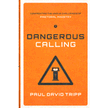Counselors Reflect on Dangerous Calling by Paul Tripp
A Series to Care for the Care Takers of God’s People
“It is quite easy for students to buy into the belief that biblical maturity is about the precision of theological knowledge and the completeness of their biblical literacy… maturity is not merely something you do with your mind… maturity is how you live your life” (Paul David Tripp, Dangerous Calling, page 25).
Several years ago, on a trip back to my home state of Mississippi (during a break from seminary), one of the pastors there jokingly asked, “How is the cemetery—I mean, seminary going?” I laughed, stated “Fine,” and then left wondering exactly what he meant by his statement. How could seminary—a place of spiritual learning—be like a cemetery? How could a place where students learn about biblical knowledge, hermeneutical principles, Greek and Hebrew be compared to a place of death? In the upcoming months at seminary, I learned what was meant by the question. At first my classes were exciting and fun. There were a lot of theological terms and phrases that I had to wrap my mind around, but I was up to the challenge. Within the following months, though, I would come to learn what this Mississippi pastor what was talking about. What was initially a question in “good fun” would soon become a spiritual reality. Though starting strong, I began spiritually withering away. Instead of treating Scripture as the Infallible Word of God, I began to treat it as a textbook. Instead of nurturing my walk with the Lord in personal quiet time with Him, I allowed class time to “count” as my time in the Word. Steady but surely, I began to wither away spiritually…to the cemetery of my spiritual life.
Tripp makes the point that biblical maturity is not about theological knowledge. If that were the case, the Pharisees would have been just fine. They knew the Scripture inside out. They could state the law and were quick to point out those that were not following it. Their hearts, however, were far from the Lord. Their words were right on, but their hearts were far from Him (Matt. 15:8). Spiritual maturity is about actually living out God’s Word. It is understanding Who God is—His character, His nature, His plan of reconciliation through His Son Jesus Christ—and living our lives in a way that responds to that truth. Scripture is clear: “Let us not love with words or tongue, but in action and in truth (1 John 3:18). Spiritual maturity is living in light of truth. It is not just about knowing the truth but the application of that truth. One of the dangers of being a seminary student, serving in the ministry, or having been a believer for an extended amount of time is that a person can know a lot about Scripture intellectually but can miss the application in his or her life. This was a lesson learned in seminary—and one that I am still learning as a biblical counselor—biblical knowledge is not the same as spiritual maturity. If the truths of study and the Word are not impacting my life on a daily basis, then I am missing part of the Gospel. What about you? Are you in a spiritual cemetery? Preparation for preaching or preparing for counselees (more on this point in an upcoming blog) does not count as personal time in the Word. We need help from the Lord to transport the truths from our minds to our hearts in order to live out those truths. Without the Lord’s help and application of the Gospel in our lives, then we, like the Pharisees, are like “white-washed tombs.”
Amen. It feels great to succeed.
 |
Dangerous Calling: Confronting the Unique Challenges of Pastoral Ministry By Paul David Tripp / Crossway Books & Bibles |